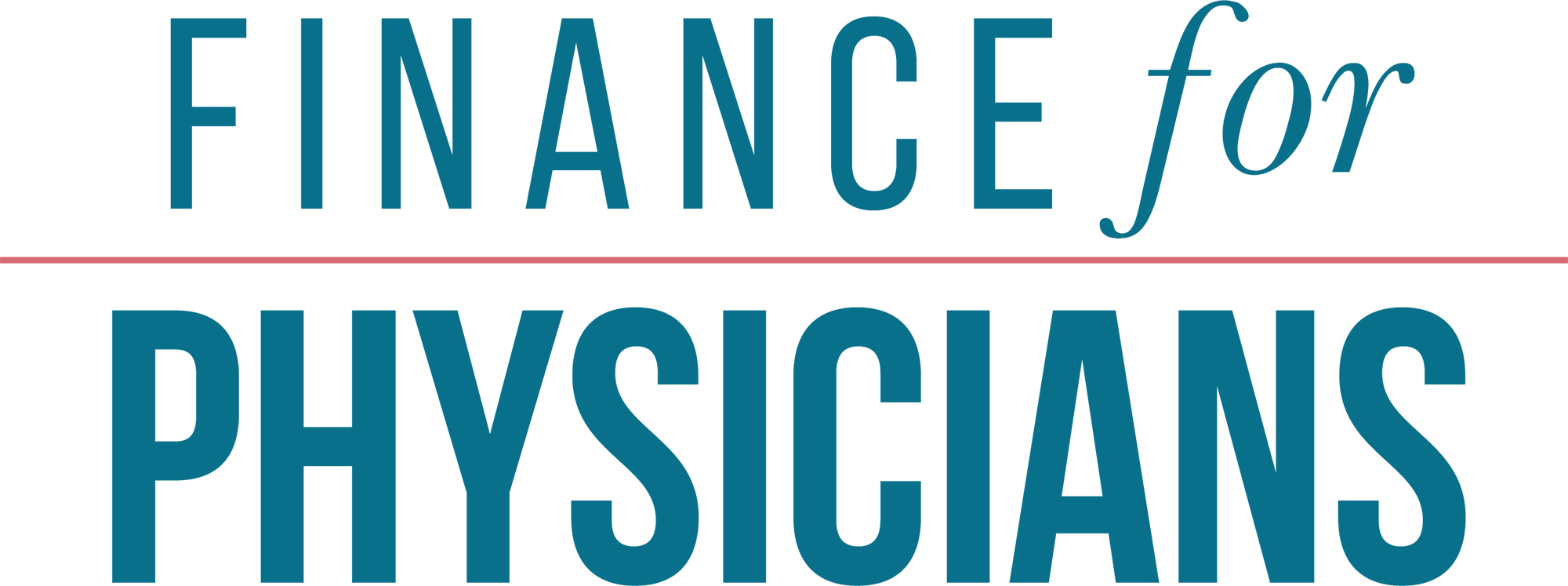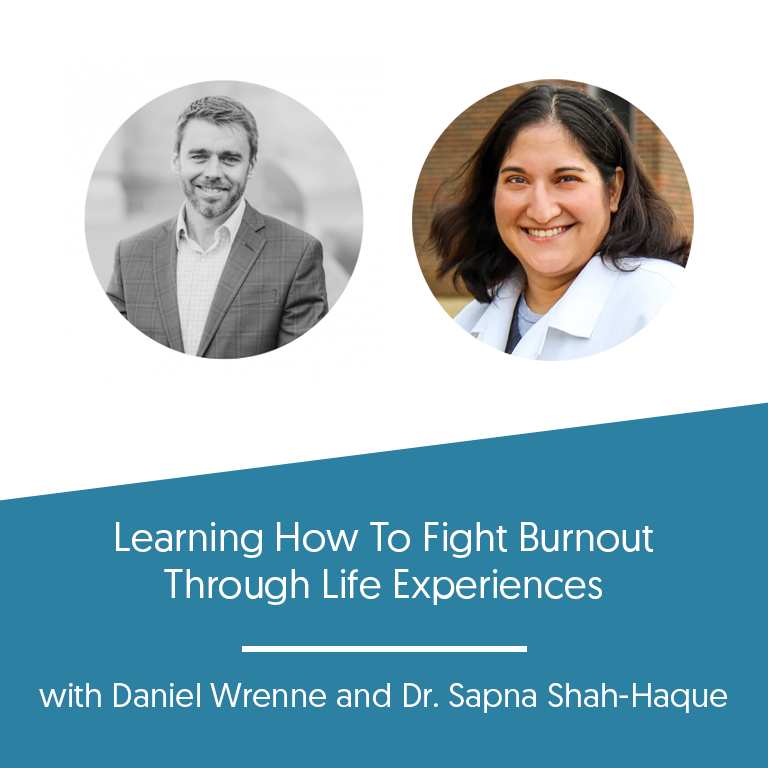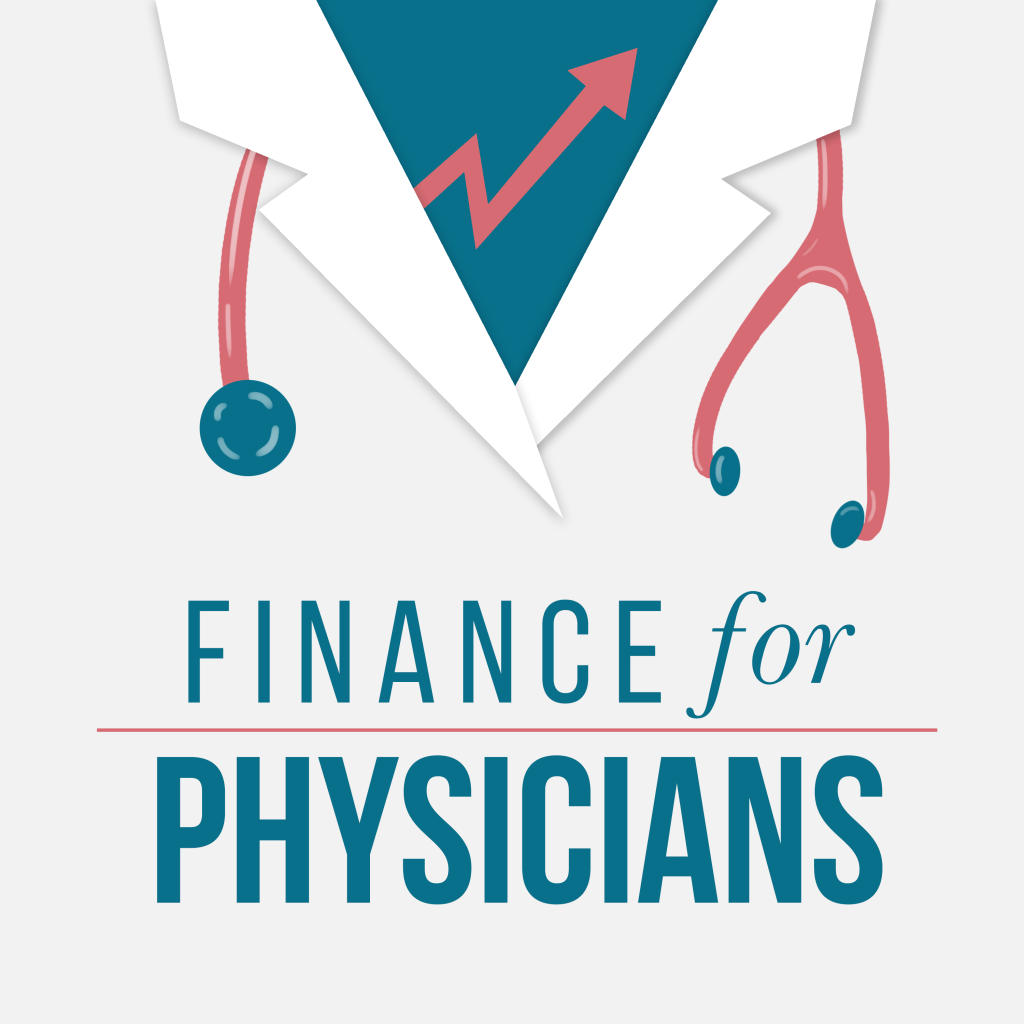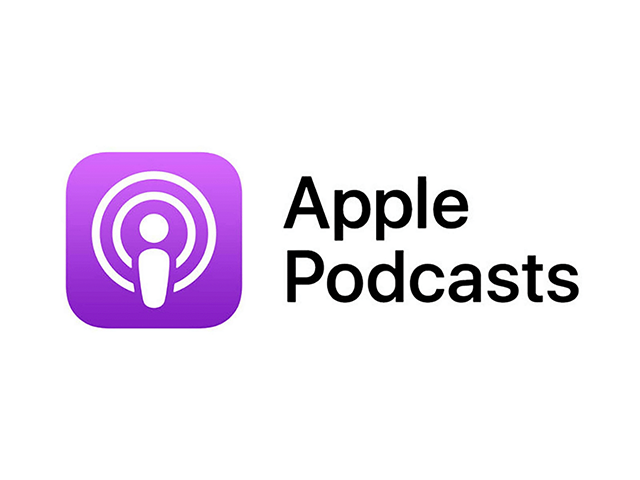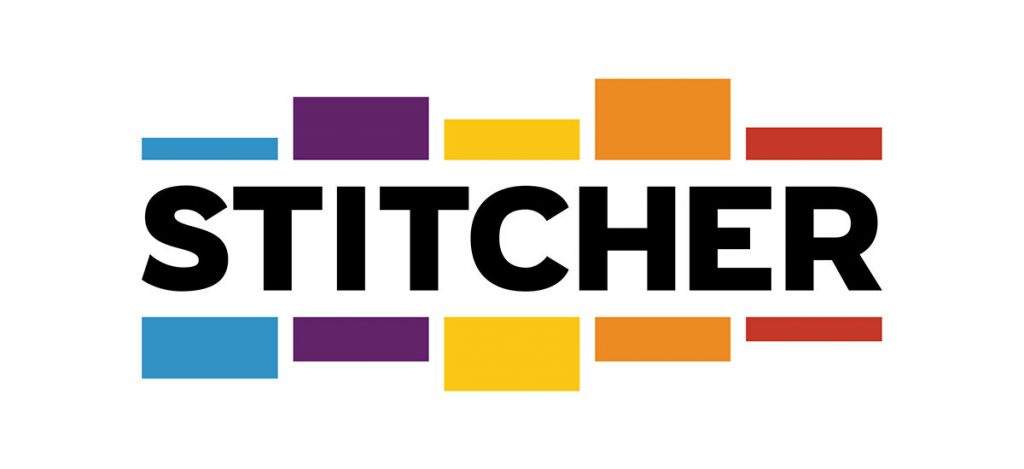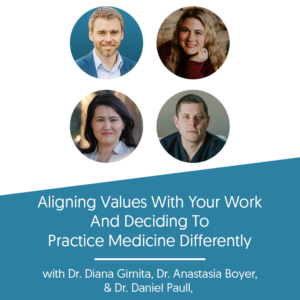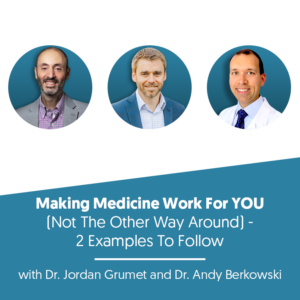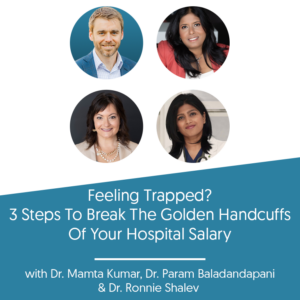Burnout is tough, especially for physicians.
But you don’t have to be a victim of it. There are ways to combat burnout. It’s not this unfixable or unmanageable thing. There are steps you can take.
This is why, for this episode, we’re interviewing Dr. Sapna Shah-Haque!
Dr. Sapna Shah-Haque is a primary care physician who’s had numerous battles with burnout, even losing a friend to it, which is part of the reason she started her own podcast and started talking more about it!
But the stress isn’t always at the hospital or the private practice. Financial matters can cause distress for physicians, but they can also be the solution.
Topics Discussed:
- How Dr. Sapna Shah-Haque overcame her numerous fights with burnout
- Why she feels her lowest moments were a result of her extreme levels of stress as a physician.
- What actionable steps you can implement to manage and beat burnout.
- And much more!
Links:
Dr. Sapna Shah-Haque’s Practice
Dr. Sapna Shah-Haque’s Podcast
Dr. Sapna Shah-Haque’s LinkedIn
Improving Medicine With Vulnerability
Contact Finance for Physicians
Full Episode Transcript:
Daniel: Hey guys, hope you’re having a great day. I know many of you mentioned burnout as a concerning topic. I know the statistics are you know getting really high for the number of physicians that are experiencing it, so we’re gonna be covering it today in the next few shows. We also, if you haven’t checked it out, we also covered it last week, Jeff and I talked about using finances to fight burnout.
So definitely go and check that out if you haven’t done so already. So today, I’m gonna be talking with Dr. Sapna Shah-Haque. She is a primary care physician. and has had multiple experiences going through burnout herself, so she’s gonna be sharing a little bit more on those experiences. She actually talks about burnout now, has her own podcast where she talks about different areas of burnout.
And so some of those experiences plus the experience of her, one of her good friends committing suicide, prompted her to start talking more about it. Sharing some of these things really we all need to be talking about in her podcast and in her work speaking. So we’re gonna be talking through some of those things she’s learned and some of the steps you can take to start to ultimately like move away from this thing.
Like nobody wants to be burned out. So we all want to know like how do we avoid that happening? How do we spot it when it’s creeping up into our lives? What are some things we can do, some actionable steps we can take to move away from that? So that’s what we’re gonna talk about today.
We had a great conversation. I know you’ll enjoy it. So without further ado, let’s jump into today’s show.
Hello Sapna, welcome to the podcast.
Dr. Sapna Shah-Haque: Thank you very much. I’m really, really honored to be on.
Daniel: Yeah. So we are gonna be talking a little bit about your experiences with burnout and some of the things that you’re doing to kind of help educate and help other physicians.
When we were exchanging emails, I believe I said this, I definitely thought this, but I’m very impressed with the work you’re doing.
Partially you’re just doing good stuff but more importantly, like there’s just not a, as many people as I would like to see talking about it. And I think it’s a super important topic to talk about burnout. And the stats are through the roof high for physicians and they’ve been going up and It’s not headed the right direction, at least at this moment in time.
So, we’re gonna be talking about all that sort of stuff and some of the things you’re working on, and I think it’ll be great for you guys listening, whether or not you’re struggling with burnout. This is just important stuff you need to know. But before we jump into all that can you give us a little bit about you and kind of where you’re at in life and maybe just a little bit of a background.
Dr. Sapna Shah-Haque: Sure. So again, thanks for having me on, and I’m a Midwesterner, born and raised here in Kansas. Also did my medical school here in Kansas, did my residency in Wichita Internal Medicine. And I’ve been practicing in rural Kansas for about little under 10 years in one way or another. I’ve experienced burnout twice myself, which some of ’em the first episode did fit it within the first five years.
But then just as a pandemic hit and growing family, I really had to scale back. And there were some life changing events that I’m sure we’ll get into that really exacerbated my, my choice to cut back to part-time and focus on more work life balance and getting back to who I see myself as more than just a physician, so we’re all, we’re all pretty complex creatures as humans.
Daniel: That is exactly right. Well, I’m curious to hear about your experiences with burnout and just with not being burned out. Both of them are important, but I think it would be good to clarify like, what exactly is burnout? Like I know there’s probably a clinical definition, but like what does it feel like? What does it look like? Can we kind of start there?
Dr. Sapna Shah-Haque: Sure. And you know, there’s a formal definition, World Health Organization, and it’s typically work related where you feel disconnected, cynical, fatigue that is not remedied by sleep or rest. And what we find is that even though that is the definition, I’ve talked to several physicians and with, remember physicians are very intelligent people with years and years of training, right? So we should be able to just have this internal clock that says, “Gosh, I’m not feeling well and these are what my symptoms are and I need to get them checked out.”
A lot of times, it takes physicians a long time to figure out why they’re so tired, why they have no energy. And it’s more than just, “Gosh, I’m working long hours.”
You know, we’re used to that through medical school and residency. So, for different people they can also present as brain fog or you know grinding of the teeth or other physical manifestations that don’t necessarily fit that formal definition.
Daniel: Is it kind of feel like stress but you know, can’t get rid of it and building or it’s just like you can’t shake it and, not excited about work anymore.
Dr. Sapna Shah-Haque: All the above, you know for me, the first time it was more of I couldn’t turn my mind off. I couldn’t turn my mind off.
No matter what you were doing,
No matter what I was doing, I have a history of insomnia, which you know, I’ve always used it to read or do something, but I mean it got to the point where I was falling asleep three or four o’clock in the morning just so that way I was so scared of missing the page. And you know, I’d be up at six or seven to do it again.
Daniel: Sleeping like three hours, four hours a night?
Dr. Sapna Shah-Haque: Correct. And some of that was self-inflicted. I will totally own, own up to that. But you know, I mean, it’s just like you can’t be on anything for sleep nor what I want to. But how do you fix your, how do you fix your sleep if you can’t get your mind to calm down and in medicine. There can be professional repercussions if you seek help for certain things like that because nobody wants to be given a mental health diagnosis.
It can potentially in some states when we go to answer questions regarding or to renew our license every year, you know, many, many, many states have, do you have depression, anxiety? Are you being treated for mental health disorder? And so, that’s one deter deterrent. Kansas has now since changed that in 2019.
I believe as of October. It was consolidated into one question to, you know if you have a mental health diagnosis or history of addiction that would impeach your ability to practice medicine. Something of that wording. So the Board of Healing Arts here in Kansas are very proposition and pro getting help.
Just they just want to ensure that physicians can practice safely, whereas in other states, that is not the way the questions are worded. So that is the reason why I say that is because that’s part of the reason why physicians, you know, we’re just horrible patients.
We don’t seek help because of professional repercussions or we are conditioned to you can’t miss work to go take care of your own health.
Daniel: Right. So you were feeling at that time when you started to feel some symptoms, you were also at the same time feeling that pressure to like not do anything about it? Or like, what does that feel like? Is it like I don’t want to admit this as anything? Or is it like, I know I have something and I need to, I’m not gonna ask for help?
Dr. Sapna Shah-Haque: I think it was just, “Oh, come on. It’s just part of the profession. Everybody goes through this.”
Daniel: Like man up or woman up or..
Dr. Sapna Shah-Haque: Exactly. Just, cowboy up is what we see.
Daniel: There you go. That’s better. Yeah. Put your big boy pants on or whatever.
Dr. Sapna Shah-Haque: That’s right. You know, and it just became very taxing became very irritable, short tempered with simple things. The lack of sleep did not, did not help. And I’m sure that yes.
Lack of sleep. is part of the profession. But it should not necessarily have to be every night when you’re getting paged or you’re getting paged when you are not on call or on vacation because, well somebody just wants an opinion.
So, the boundaries were very blurred. And there’s a culture of never saying no in medicine.
Daniel: Yeah, I’m curious of your thoughts. So you mentioned the culture of medicine, and I know that’s a contributing factor. You know, never saying no. What are some of the other things in terms of the culture of medicine that you mentioned? Like the mental health stuff, like the fact that they’re asking these questions that are not probably appropriate, at least in my opinion, questions on some of your licensing that’s gonna cause you.
I mean that amplifies the not wanting to be taking care of your own mental health. What are some of the other things about the culture of medicine? Cuz I’ve heard that a lot and I agree with that. Is that’s part of the issue here.
Dr. Sapna Shah-Haque: Absolutely. So first and foremost, most people did not go into medicine for the money.
You know, we give up about eight to 10 years, and that’s just for schooling. Assuming that four years of undergraduate, four years of medical school, and then at least three years of residence. So it’s not for the money because we start behind the eight ball and come out with 200 plus thousand dollars of debt.
So it’s incredibly expensive to pursue medical school. I think that there’s a culture in medicine where, this is the way it has always been done. This is the mold that you need to fit and just shut up and do it. You know, if they could tell you make it, which is that’s not healthy, nor is that sustainable.
Yeah. Now, I’m all for professionalism, but you can also maintain your individuality while being professional.
Daniel: Right.
Dr. Sapna Shah-Haque: And it seems like that’s not necessarily, at least when I trained, I had great support, but I can also tell you that there you have to fit a certain mold. You have to be perfect all the time.
And while I agree about giving a hundred percent for patient care, because patient safety and good outcomes that’s what we all want. But I’m not a superhero. They don’t give us a cape when we graduate medical school or residency, so sleep is important. And we know that when driving with a lack of sleep. Or incredibly, sleep impaired that’s equivalent to driving intoxicated.
Daniel: Right.
Dr. Sapna Shah-Haque: So those are some things that are, we have crazy expectations for physicians that are based on tradition. The fathers of medicine, we’re all dead up on cocaine while working those crazy hours. Residents, where the word comes from is that the trainees used to live at the hospital.
Daniel: Literally.
Dr. Sapna Shah-Haque: That is literally, literally.
Yeah.
Right. So I think some of the expectations currently are antiquated.
Daniel: Yeah. My buddy that I run with every morning he was actually on the podcast a long time ago.
He’s a doctor of parenting and child development, like he’s a professor.
And we talk about our work a lot and when we’re running, and I shared with him not long ago about physicians in the burnout and statistics and all that stuff and how a lot of them struggle with self care and he was blown away.
He always wanted to get into medicine. Long story, didn’t get into it, but, he was blown away by the fact that he always kind of thought of like physicians as top tier of taking care of themselves and had it all figured out and that kind of thing. And, maybe on their Facebook profiles they look like that.
I don’t know. But it seems like self-care is a big deal and being patients come first and sometimes to the you end up being second and I think that’s a problem in itself.
Dr. Sapna Shah-Haque: It is. It is. One thing I wanna clarify is that is not the patient’s expectations, right?
That’s not the patient’s expectations. I have fantastic patients that do realize my humanity and I’m appreciative of that. One thing is that we are trained that way through medical school and residency, the patients always come first and, well, I’ve never missed a day of work or I only missed one day with the flu.
Or we will hear, oh. I’ve talked to other physicians where they know that they should have stayed home but it’s a badge of honor to show up to work and not take care of yourself. So it is the culture and you know, self-care is not selfish. If that is the way you replenish your cup, Because we can’t be running on fumes. We know that when physicians are burned out, there are more medical errors made. It costs a system more money, and there are worse outcomes because of all that. So in the end, it really does matter, financially and for patient safety, plus for the safety of the physician.
Daniel: Yep.
Dr. Sapna Shah-Haque: 300 to 400 physicians a year here in the United States take their own life.
Daniel: Yep.
Dr. Sapna Shah-Haque: They die by suicide.
Daniel: And, how many people wreck their cars on the way home from work after stupid long shifts? And, you know, maybe who knows what those statistics are? I’m sure that’s hard to figure out. And then, family issues that it causes like when you come home and you’re like, spouse is like, “Where are you been?” You know, there’s always, there’s a lot of problems that can come from all of that, but I think it’s imbalance. Part of it is just you have to have balance. It’s impossible to be perfectly balanced, but having correct zero balance, like all in on 100% on work professional.
Dr. Sapna Shah-Haque: Right.
Daniel: Even if you absolutely love it. That’s the problem is like people love it going in. A lot of people we work with, but it almost like ruins their passion or at least hurts it because they’re so all in on it. Anything you go all in on, like that you’re gonna suffer from when you don’t have balance.
Dr. Sapna Shah-Haque: 100% on point.
Daniel: So like, you’re motivated to talk about this. And I referenced that earlier, like~ a lot of, ~I’m blown away in these statistics, what is it like over 60% are saying they’re burned out in medicine, right? That’s like the latest with the pandemic, post pandemic. But like there’s still not a ton of people talking about it.
And I thought, I would think on the surface, like there’s a ton of people like 60% of physicians are burned out. I would think there’d be tons of people talking about it and there is more and more people talking about it. But how come nobody’s talking about it? And what motivated you to start talking about it?
Dr. Sapna Shah-Haque: I think that people are starting to wake up and you have some other physicians that may not be, that may have transitioned previously into like physician coaching or they’re still practicing. And so I think we’re seeing more and more physicians waking up, healthcare professionals waking up.
But for me personally, I’ve experienced burnout twice and you know each time, I did try to address it as soon as I recognized it. Of course, it takes a while to recognize it. Once you experience it, you’re kind of on the lookout. At least I’ve been on the lookout for it. So it’s, I’m kind of always aware of it.
Hey, I need a scale back or I need to just not, yeah, I need to take some days off and not do absolutely nothing, you know, that’s also productive if it is recharging. But the biggest thing that really pushed me forward was in 2019, my best friend from medical school and residency, also a physician in my hometown died by suicide.
And you know, when you get that call, I got a call from her spouse, while I was at work, and that’s how I found out. When you receive that type of news, I think it just, it changes you. It makes you think, “What in the world am I doing?” Not that I want to leave medicine, I did not want to necessarily leave medicine, even though at that time I was grieving enough or I probably could have walked off. I had to really stop and process what was going on and say, “What do I want out of life? Am I okay with working 5, 6, 7 days a week?”
And the answer was no. So I had to spend time processing, grieving, and then figuring out.
What do I want from life? What does that look like? And was medicine gonna be a part of it? And, ultimately, yes, I did not want to leave medicine because I love internal medicine. I love my patients, I love what I do, but I had to find a better work life balance in order to see myself doing, doing exactly what I’m doing in, you know, 20, 30 years.
So for me, I chose to go part-time, I was able to, I figured out what I needed or what I could give up in order to make that happen.
Daniel: So, seeing your friend in that whole situation and your experience dealing with it, and then you’re thinking, you know I need to help other people.
Is that really the trigger like that? Cuz the podcast is a helping thing. Like you know, talking about burnout is like a sharing thing and open thing and I mean, you could have just gone on your way and you know lesson learned and you’re working on balance and life’s better and you’ve gotten through it, but like you’re doing stuff now.
Dr. Sapna Shah-Haque: Right? So, I have the Worthy Physician Podcast. I’ve started that up in about April of 2021 during the pandemic. For me, as a way of, a way of grieving. And also, if it can help one person, another physician, or even a non-physician saying, “Hey, you know what. This is important.”
This is life we’re talking about. We’re talking about human beings. We’re talking about head, shoulder, knees and toes. And just because people don’t talk about it, just because physicians do not talk about it, it’s because we’re a condition not to. If you ask for help, that means you’re weak. That has been part of the culture.
That is not the way it is everywhere. So I wanted to know, I want to help to normal the topic of mental health, of the topic of being human dissatisfaction among physicians, about burnout, moral injury, or just being fed up with just the unrealistic expectations that are placed on us. So that is the reason why I started the podcast and I’ve learned quite a bit from it too.
So I also appreciate making the connections with others, learning and even trying to implement a lot of that into my life. So, I also learned from it, which is fantastic.
Daniel: Yeah, that’s been my experience as well. It’s great to interact with people, you know, and different experts in that kind of thing.
Dr. Sapna Shah-Haque: Exactly.
Daniel: So going back to your friend, I’m curious, so was she struggling with burnout herself? Was it kind of a surprise thing? Like I don’t wanna, if you’re not comfortable going into the details of that, I’m just curious, like was there anything tied into to what we’re talking about that you learned from her situation before the fact or after the fact? How did that play out?
Dr. Sapna Shah-Haque: You know, the Dr. Vicker’s suicide was a complete unexpected, she was always, I mean, she made rounding at 3:00 AM and the ICU looked fabulous. You know, she could be incredibly tired, but she looked, she was always very well put together, very positive. I don’t think anybody would say a bad word about her.
And her patients absolutely loved her. She did not want to seek professional help because of professional repercussions. And so she did, she did not seek, the correct. The correct avenues or had underreported symptoms of depression and her suicide was a tragic loss for many, for the medical community as well as her family and friends.
Daniel: Yeah.
Dr. Sapna Shah-Haque: But the fact that a physician was worried about professional repercussions before, and that’s the reason why an individual did not want to seek the help that she knew she needed. It’s tragic, but it is a big barrier to physicians seeking help. One thing that Kansas has done and is that there, the Board of Healing Arts has consolidated that question again.
Do you suffer from, mental illness that would impede your ability to practice medicine? Which is much different than, have you ever seen a mental health professional?
Daniel: Right.
Dr. Sapna Shah-Haque: You know, that could be a therapist or a counselor. And so when there is a profession that is asking that type of question, but you would give different advice to your patient, but you cannot follow your own advice. That seems like a double edged sword. That is definitely a double standard and that is not safe.
Daniel: Yeah, that’s a problem. It’s like, you’re unable to practice what you preach.
Dr. Sapna Shah-Haque: Right. And so when I’m very proud of Kansas and again, can’t say enough good things about the Board of Healing Arts here.
Because they are pro physician and they are pro getting help. I’ve spoken to two of the Board of Healing Arts members and they’re just phenomenal gentlemen.
And that’s awesome. You know, we need more individuals like that. We need more individuals like that in leadership, that can help to change the expectations of physicians.
So the fact that some, yeah, some do have it figured out and I’m happy for them. But a lot of us are, at least for me, you know, it’s fluid.
Life is fluid. I have no idea what next week will bring. I have no idea what next year will bring. And so I have to be able to change with that and that’s fine but we also have to have a community and culture that will also acknowledge that and not be so stuck in tradition just because that’s the way it has always been done.
Daniel: Yeah. I talked several episodes back. I think it was like, in the episode 50 range.
I talked to Dr. Budin. He’s a very experienced physician and was on later in his career. And the way he describes it is he came out of the closet with his bipolar and he talked all about this exact specific topic of mental health and how the questioning is very critical and, and how he felt all this pressure for years and years and years to not come clean on his mental health condition and eventually did, and it was the best thing he ever did.
And then in another show I talked with Tina Runin and she has started a company, it’s called 10 Health, and they are helping their whole mission is to provide mental health services and counseling and that kind of thing to physicians and healthcare providers in a private like manner to where it’s not like insurance disclosed or whatever to help kind of cater to this. So there’s people working on the solutions. I think the states have to change some of their questioning too. I keep hearing that over and over again.
Dr. Sapna Shah-Haque: Yes.
Daniel: But these are, you know, people are working on these solutions. And that’s great to see, but I want to shift to. You know, if I’m a just a physician myself, like what kind of trigger I should be looking for?
Like, maybe I should be asking for help or maybe this is something I should look out for that’s happening in my life. And I know you’ve mentioned a few already, but what are some thoughts on that?
Sure. So, one thing I would say is that really check in with yourself and even have somebody that you trust, whether that be your spouse, best friend, a coworker or something where you’re checking in pretty regularly, every three months or even more frequently to see, “Hey, do I feel fulfilled in life? And not just my work, but my personal life, my life outside of medicine.”
Dr. Sapna Shah-Haque: You know, making sure that all those boxes, the play box, the spiritual box, the work box, the family box are all checked, you know? And if one is being neglected, definitely start to try to cultivate that.
Daniel: Yeah, like then that requires having relationships, which is kind of to me, one of the boxes is relationships.
Dr. Sapna Shah-Haque: Yes.
Daniel: So you kinda, you have to have relationships to do what you’re just, what you’re saying. Like you have to have someone to be able to talk to. Some people don’t even have anyone to, a lot of people don’t even have anyone to talk to, which is a challenging spot to be in cuz you feel alone.
But, you know, in that situation, I think the first step is you gotta proactively, find people that you can relate to and have that conversation with.
But being able to have that conversation with someone, that’s the guy I run with like I was talking about earlier.
Like, I have that guy buddy of mine, and my wife and but different circumstances you want, like professionally. I talked to him about that stuff and so, it’s amazing to have a person that you can say anything in the world too.
Dr. Sapna Shah-Haque: Yes.
Daniel: And that they’re not gonna judge you and that they’re gonna like allow you to be vulnerable and that sort of thing.
It’s amazing to have that kind of person in.
And once you do, you can just you know, you want to check in and check in with them as much as you can. Cuz that’s, they’re gonna be kind of that you know, mirror cuz it’s very difficult to self diagnose.
Dr. Sapna Shah-Haque: Oh yeah, for sure. And once you’ve established that relationship. If they say, “Hey, you know, you seem kind of off.”
“Well in what way?”
You know, take that inventory and really see, “Okay, well, gosh, yeah, I’m getting irritable. Why? Why am I irritable?”
Being able to, I think, and this is something we are horrible at sometimes in medicine, is really looking at our emotions and it seems very fufu, but I think it’s very important to say, “Okay, what are my emotions here? Why am I irritable? Oh, because I’m angry, or I’m angry because I’ve told five patients this week that they have cancer. Or I have been getting little sleep, or I feel overwhelmed because of these projects.”
You know? So it’s important to label those things and then once you label those things, I would say prioritize and delegate as much as you can.
And at the end of the day, if you don’t recognize yourself or if you find that you’re not satisfied where you are in life, change your narrative. Really sit down and look at what you need to be able to achieve that satisfaction. And for each person, that’s gonna be different. For me, it was more time to look at things outside of medicine, such as the podcast, such as speaking, such as getting outside, and not being under fluorescent lights.
That’s what I needed. So for each person, it’s gonna be different.
For those that do not have, for physicians in particular, if you do not have somebody to, that you feel that you can talk to, there are resources online where these are volunteers. And one is Physician Coach Support. They are available. It’s not 24/7, but it is seven days a week via Zoom.
These are physicians that are volunteering and you know, from one physician to another. It is important to have that connection. Sometimes when you’re speaking to somebody that is not a physician or non-medical, some things get lost in translation.
So sometimes it’s nice to speak to a peer. Another one is Physicians Anonymous. That that has been started by a physician in the UK and that is via Zoom as well. I think those meetings are on Tuesday night, again via Zoom. So there are, there are ways to connect and to maybe hash out some of these things.
Daniel: Yeah. I’ll link to those in the show notes.
But yeah, resources are good. You mentioned prioritizing and delegating. I’m curious what exactly you mean by that.
Dr. Sapna Shah-Haque: Sure. So for me, prioritizing. When I’m at work, I concentrate on work, but when I’m at home..
Daniel: Work’s off.
Dr. Sapna Shah-Haque: Work is off. It’s I’m, I hang the doctor hat up.
Daniel: How’d you do that?
Dr. Sapna Shah-Haque: A lot of com compartmentalizing. And I, you know, it’s never a hundred percent. I do stay up thinking about my patients. I do stay up worried about my patients. So you know that patients that we really care about our patients as physicians, and yes, they keep me up at night at times.
So it’s not always a hundred percent, but I do the best I can and I do outpatient only. So I gave up hospital work a couple of years back, and for me, it’s worked out well but you know, I’m payable at, in the after hours and on the weekends, you know, we have a call group as well. So, there’s that barrier as well too.
I’m not being on call every weekend. We have, I think about six physicians, more or less that are in the call group. So it’s nice to be able to rotate.
Daniel: Yeah. And delegating.
Dr. Sapna Shah-Haque: Delegating. You know what, my house is not gonna be, I mean, it’s clean, but it, you know what? I have small kids. They live here.
It looks like they live here. So yes, there are toys, there’s crayon on the wall. I have, and just you know, started to embrace their creativity and for me that’s okay. And we’re pretty open. I’m pretty open with anybody. “Okay. Yeah, you know, I have kids and they looks like they live here. So if that’s not okay with you, we can meet elsewhere, right? For coffee or what have you.”
But also if mowing the lawn it needs to get done. However, if that is another to do thing, if it is in your budget, have somebody else get your lawn, have somebody else do you grocery shopping and deliver groceries to your house, we have, we can utilize technology with for that, right?
There are also other, wanting to eat healthy is good, is also self care.
And for those weeks that get crazy. Yeah, we’ll do, I’ll do freshly or fit and lean.
So those are nice things to have that are ready and little middle of the road, but you don’t have to spend a lot of. So that’s just the way that I delegate.
Daniel: I gotcha. Yeah, those are good. I think developing the habit of like comparing things. So that’s the prioritizing part. So for example, If you’re busy, everybody’s busy now. Right?
Dr. Sapna Shah-Haque: Right.
Daniel: So like everybody’s busy. So let’s just acknowledge all of us listening, have all of our schedule committed to, we’re all busy.
And so one commitment is taking away from another opportunity. So if you’re gonna mow the grass, that’s time you’re not able to spend with your kids, for example.
Dr. Sapna Shah-Haque: Correct.
Daniel: So if you don’t feel like you’re filling the bucket with your kids, like do not mow the grass. Like there’s plenty of people that wanna work and need the income that will go and mow your grass and do a better job than you will that you can pay. And they’re happy. And you’re happy and you get to spend time with the kids.
Dr. Sapna Shah-Haque: Exactly.
Daniel: There’s all kinds of things like that in our everybody’s lives and physicians are in such a good position because you have the income, which is great because it gives you the ability to be able to do those kinds of things.
So outsourcing, prioritizing, and outsourcing. I like that, you know, way of wording it, but you can look at those things that you consider like not, so for me, like mowing my grass is way lower than spending time with my kids. And so being able to have someone, you know take that off my plate and opening up time for me to spend time with kids is, that’s an absolute home run.
And you can do that in all sorts of like cleaning the house, like you know, all sorts of different things in your life.
Dr. Sapna Shah-Haque: Right.
Daniel: Especially for those things that are lower priority.
Dr. Sapna Shah-Haque: Absolutely. Absolutely.
Daniel: And that free us up capacity to recharge. Like me, recharging is like wrestling with my kids in the basement.
Like that’s a recharge thing for me.
Dr. Sapna Shah-Haque: Right.
Daniel: You know, to kind of get some shake things if work is stressful and that kind of thing.
Dr. Sapna Shah-Haque: Well, we also know that just human interaction with some of our favorite humans. There’s nothing better in the world. It’s incredibly therapeutic.
Daniel: Like laughing and like dancing and being a dummy, like that kind of stuff is good.
Dr. Sapna Shah-Haque: Exactly.
Daniel: For like, I don’t know. I’ve never experienced major burnout, but like I’ve had plenty of stress and anything I can do that’s like laughing or you know, fitness, like running as hard as you possibly can, it just clears your mind and allows you to kind of work through stress and those sorts of things are huge.
But I think when in medicine, there’s two things that I see restrict people as time and money, and I think that’s true in everything. In training you have like such limited time and even in practice sometimes, and it makes it more difficult when you just have so much time that’s already committed.
And then on top of that, sometimes the finances are already committed to as well.
So in other words, you’re required to commit the time because you have so many financial commitments. That’s also kind of a restricted, sort of environment. But I think you’ve done some podcasts where you talk about like getting that ability to recognize that and saying no, like saying no is something, and I think we talked about it earlier, like being able to say no is a big deal.
Dr. Sapna Shah-Haque: Correct. So I think boundaries are huge, right? We have boundaries with property lines. And why is that? Because we don’t want everybody trampling over our lawn or somebody stealing on our cable, what have you. That might be antiquated nowadays for some listeners, but it was a real thing back when I was.
Daniel: What’s cable?
Dr. Sapna Shah-Haque: Exactly. What’s cable nowadays? You don’t want anybody stealing your wifi, right? So, We need to have boundaries with our time. We need to have boundaries with a big resource, which is energy, right? If they’re only 24 hours in a day, and I’m gonna put in a hundred percent each day when I get up, what am I gonna put that a hundred percent toward?
So I need to allocate what’s important to me and what is going to be important for my patients. And then also outside of that, well, what’s important for the kids? What’s important for me to recharge, to do it again? And if something that is being asked of me, is not in line, or if I don’t feel like it is something I can actually do because I just don’t have the time or the energy.
It’s okay to say no. It’s okay to say, no, I can’t do it now. Maybe later. And give another option if you want to, and if you just wanna say no, I can’t do that and leave it at that.
That’s perfectly fine.
And it’s not to be, it’s not to be pushy or to be arrogant, but you can also draw boundaries around your time and your energy because we also know that spreading yourself too thin and anybody in any profession, is sometimes rewarded. Right? But what’s the point if it drains you? What’s the point if the stress decreases your daily satisfaction?
Daniel: Yeah, right. I volunteer with a retired physician doing homeless stuff and he, I’ve talked to him a lot about his career and everything and I’ve heard multiple people say this, but his biggest regret is working too much and spent not spending enough time with his family and doing things like volunteering, like we’re doing now.
And when he was young and, you know able and that sort of thing. His regret was not having, you know, dedicating too much time to his practice and basically like saying yes to everything related to work. But you know, you don’t want to get to the point where you’re the person in the late stages of their life. That’s like regretting having not said no. So I think reminding yourself, for me, it helps to, and my wife helps me too sometimes. Like the people in my life that I love, help me remember this, but like reminding myself, when you’re saying “yes” to something, by definition saying “no” to something else.
So like, what are you saying no to is really the better question if you say yes.
Dr. Sapna Shah-Haque: That’s beautifully said.
Daniel: If you can remember that. I have to some, I forget it all the time, but like if I can just, it’s like write it on my screen. But especially, I’ve developed a muscle, I think it’s a muscle too.
Like saying no is a skill. Nobody, well, some people are naturally good. I was not naturally good at it. I’ve had to work on it. But if, especially if you’re trying to work on that. Like saying no boundaries type stuff, you literally put it on the screen like so you see. Because we all forget, we get so busy, especially in if you’re in busy mode, like you forget what you know, how old you are, what day of the week it is.
Dr. Sapna Shah-Haque: It’s just the unreal.
Daniel: The mind gets kind of fogged. Well, as we start to wrap up, any other suggestions or tips for people on like navigating this whole like career balance or even maybe people that are struggling with burnout or asking for help. I think you’ve already thrown out some great resources,
But other resources or ideas or, I know everybody should check out your podcast. That’d be a great place cuz you’re teaching stuff. I mean, like you’re talking to experts and talking about this stuff and you can really dig in there. But other things that come to mind that we haven’t talked about yet.
Dr. Sapna Shah-Haque: Yeah, I would say, coaching is definitely something I think physicians should, or people should consider, right? Because it would be something that is not necessarily labeled as a mental health professional.
Daniel: Yeah.
Dr. Sapna Shah-Haque: And you know, they’re not there to necessarily give you advice. They’re there to help you look for your own solutions. So coaching is always a good middle of the road.
Daniel: I think I, my opinion is that everyone would benefit from coaching.
Dr. Sapna Shah-Haque: Yeah.
Daniel: Sometimes a difficult jump to say yes to that and it’s expensive. It’s like, I don’t wanna pay, you know, thousands of dollars to, cuz you’re paying a super smart person to help you through things.
Right. But if you’ve ever, I’ve worked with multiple coaches and basically what they’re doing is like helping you to identify yourself. Like what are those most important things or priorities like we were talking about earlier. They’re gonna help you like, identify the priorities.
Like where you want to go, what’s most important, and then look at your life and say, where am I outta line here?
Like, what am I doing? And they’re gonna become like that mirror that’s gonna say cuz they’re not, like you were saying, they’re not like pushing you anywhere. They’re just helping you to self-direct in that ideally that direction of like what’s most important. And everybody wants to do that. That’s the thing everybody wants to move towards like an ideal life.
And I think that’s a great suggestion. But it seems like it’s been now there are a lot more, I see like physician coaches, like physician coaching physicians, and that’s really good to see, you know, as an expanding thing. But I think, like I said, everybody in my profession, like it’s been a thing, like it’s kind of a thing that people have coaches.
But for the longest time it didn’t seem like there was many physician coaches.
Dr. Sapna Shah-Haque: Yeah, I think it’s starting to pick up more and more. I see a lot more enthusiasm maybe because for that, again physicians, we are really taught to educate our patients. We’re taught to help with the lead them down a certain road.
Motivational interviewing. we are taught how to communicate with patients. And so we learn a lot of these skills in medical school, which are I think are very parallel with what coaches do. And so I can see why more and more physicians are having that as an interest. I would definitely say, you know, I understand 100%.
I do understand the professional, how scared you can be as a physician or another professional in to to seek mental help, but you are definitely worth it and you know, get involved with American College of Physicians is for internists, get involved in your professional groups, get involved and really try to legislate to the Board of Healing Arts or to the bodies that be, that make up those questions because I do need to be changed.
Start somewhere with trying to advocate for that change. But before you do that, if you’re feeling like you need help. Seek help because you are definitely worth it. You can be replaced at work. I’ve seen it happen, at the drop of a hat, but you cannot be replaced at home.
Daniel: Yeah. Do it for family, you know, seek help.
It’s okay to ask for help. Everybody needs help. That’s the thing. Everybody needs help. All of us also, so I said we all need a coach would all benefit from a coach. I also think everyone would benefit meeting and work and talking with a therapist.
Dr. Sapna Shah-Haque: Amen. Yes.
Daniel: We all need, we all got all this baggage, so I go see a therapist, I’m like, I don’t wanna talk about my childhood.
They’re like, you know, within a few minutes we’re somehow talking about childhood. And I’m like, crying. I mean, but that’s how you work through those things. And you know, you feel better at the end, but it is intimidating sometimes for us perfectionist type A types, you know, to seek help but it is, everybody needs help.
Dr. Sapna Shah-Haque: Yes. And to be honest with you, since my friend’s suicide, I’ve been in therapy and it is because it was a huge loss. Suicide leaves a lot of unanswered questions.
Daniel: Yep.
Dr. Sapna Shah-Haque: And I’m not gonna sit here and judge somebody for doing that, because that person must have been in a lot of pain to do that.
Daniel: Yep.
Dr. Sapna Shah-Haque: And that’s sad because we lose so many beautiful people every year. The suicide, whether physician or non-physician. It is just too common. So I would love to see those numbers go down. I would love to see that physicians and other professionals can actually talk about, “Hey, yeah, today was really hard and this is why.” And have it be okay and not be looked down upon for vocalizing or showing their humanity, showing their vulnerability.
Daniel: Yeah. Well keep up the good work you’re doing. I know that’s helping. You know, move the needle. It’s a big needle to move. Like I know the profession. The profession is you know, well entrenched and you know, a lot of people like to do it just cuz that’s the way it’s always been done.
You know, I’m sure you’ve heard that a million times, but like what you’re doing is making a difference and I’m glad to see it and I’ve enjoyed talking through this. It’s been very helpful. So thank you for coming on and I definitely appreciate this. We’ll have to sure continue on the discussion.
There’s a lot of different directions you can take this stuff.
Dr. Sapna Shah-Haque: Sure. Anytime. I would love to, and thank you so much for having me. I really enjoyed it.
Daniel: Yeah, thank you.


